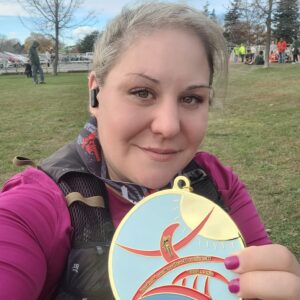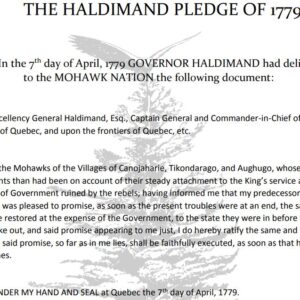
I was originally appointed under the first version of the cannabis law which put me on the commission for a maximum of three years. I was appointed on May 31, 2019. There was an option for me to extend my term to the full 4 year term of Chief Commissioner under the 2021 version of the law but I decided not to do that.
I felt that it was fair and better for me to stay for my original term length and no longer so that others in the community who want to see cannabis regulated on the territory could participate in that work. I stayed on as Chief Commissioner until July 6, 2022.
During my time as Chief Commissioner, I was given the opportunity to work with 13 Haudenosaunee people from Six Nations who invested hundreds of hours to build the current Six Nations Cannabis Control Law and its accompanying Regulations. It was very hard work and they all walked into the project dedicated to it, often sacrificing their personal time and taking a jab or two from some (at time unfair) criticism coming from the community. They were all dedicated professionals who brought experience in the areas of law, gaming, social work, on-reserve industry, science, cannabis and knowledge about Six Nations and it’s history to the table. This crew of individuals all contributed their wisdom to build the system that is currently in place and their efforts to protect the health and safety of Six Nations are their efforts are worthy of being acknowledged and celebrated.
Misinformation has recently been circulated about the nature of the end of my term with the Commission. It is really disappointing to read claims that some kind of nefarious inner workings were going on with the team that I was a part of for three years. These are out of touch with reality and only serve to try to de-legitimize the efforts of those from the community who helped the Commission to build a system that would protect cannabis consumers, dispensary owners and producers on the Territory.
Despite those untrue claims being made, I will not disclose the details of someone’s license or any issues surrounding their business. However I will share that during my time as Chief Commissioner, my team and I regularly briefed the Elected Council on all matters of concern — including claims by industry participants if they were unhappy with the choices of the Commission. Some people may view that as the Commission not being transparent enough with the community. From a regulatory perspective, there is no benefit to making regulatory matters with individual businesses an open book for anyone on the territory to read. And pressuring the Commission to release details about regulatory matters by claiming there is no transparency is a weak rhetorical argument that will not make Six Nations any safer. In fact, it would do the opposite.
There are many people on Six Nations who don’t want there to be a cannabis monopoly. No one wants to see non-indigenous people coming onto the territory to set up shop here and to dominate the space because it’s in some kind of regulatory grey area. Everyone that I spoke to who is already in, or wants to be in the cannabis business on the reserve feels that way. There should only be cannabis businesses on Six Nations that are owned and managed by the people of Six Nations. Hard stop.
However, when the government passed the Cannabis Act in 2018 — that kind of slow creep in of non-indigenous people looking to make a buck on the rez started to happen. I followed my instincts when I joined the Commission, to do something good to work with community organizations to stand up and help build something that would protect our territory from non-indigenous people and other bad actors looking to taking advantage of those on-reserve grey areas when it comes to cannabis.
I don’t believe that everyone involved in unregulated cannabis is involved in organized crime. But I do know that there is a direct co-relation between the bad actors using the unregulated cannabis space on our territory to import guns or other drugs — and the increase of human trafficking, addictions and violence against our people that comes with that.
This is why the community absolutely must occupy the regulation of cannabis on Six Nations. The province isn’t offering any resources to protect our people. Neither is the federal government. The whole onus falls on Six Nations. I saw that, and pitched in to help.
It is unfortunate that other people believe my participation was for any other reason than to lift up what I thought and still think is the right thing to do.
I am a Haudenosaunee auntie and mom. I am also that type of mom who is second mom to many of my children’s friends. And I grew up as a child on Six Nations. As such the protection of children is always the thing that I think about first. What I think about second, is the differences that I see between the community I grew up in and the community my children are growing up in — and what that huge difference will mean for the type of community Six Nations will be when my grandchildren grow up here.
That is why I helped the council build a cannabis regulatory structure and build the cannabis law, and I know I made a good choice. It was tough, and challenging. Some people came straight up to me and told me that I failed. I do not agree with that and I don’t see it that way.
I am not afraid of a challenge. I am not afraid to attempt to work on anything that has a degree of difficulty to it and see that work through to the end. I am not afraid of being on the opposite end of what others believe in and I am not afraid to be the only person holding the perspective that I might on any given subject.
I am also not afraid to take action on something that I believe in, even if other people are collectively working on something contrary to what I believe in. It’s never been about knocking anyone else down – but building what I believe in.
What has been difficult, and where I continue to struggle, is walking through the mean things that people have said, armed with misinformation, and maybe even with bad intentions — to invent a tall tale about what was going on.
I had friends and family getting bullied for their relationships with me. People I loved were being isolated and excluded from jobs, conversations and opportunities because of their connection to me. One person shared that the rhetoric they were hearing combined with the bullying they were experiencing for our relationship was so bad that they eventually became too afraid to talk to me at all in a public space.
Over the course of the last three years I have had people who disagreed with my involvement in the Commission threaten my husband and children with violence.
I was called a traitor and a secret millionaire, only in this for the money.
This was started because of misinformation that was intentionally given to make the idea of a cannabis regulator so “controversial” that no one wanted to touch it, or anyone connected to it.
It was painful to see people I trusted reveal that they didn’t trust me enough to come and have a conversation with me to find the facts.
I recognize that lateral violence is a problem in our community. And I am disappointed that lateral violence clouded the work that the Cannabis Commission did because it has been good work.
Six Nations is home to innovative thinkers with great ideas that want to work together to make sure the cannabis industry brings economic growth to everyone, and not just a few. Unfortunately, few people were willing to carry on with that work long term because at the end of the day, the onslaught of negative and untrue tales being told about the Commission weren’t worth the cost to people’s personal well-being.
There is enough room in the community for disagreement and diverse thought on absolutely every issue that we have in our community. Diversity is our strength. But the intentional work being done to disempower or harm people on a personal level because they have a different perspective on political issues is only preventing things from getting done and stopping Six Nations from advancing.
While I do still believe that the work of the Commission is good, I think there should be some changes to the way cannabis is regulated on the territory. On numerous occasions I told the Elected Council that putting individual community members in charge of regulating the industry is putting people at risk of real harm and isn’t fair to anyone. The issuing of cannabis licenses, now that the Cannabis Law is finished, can continue but does not require the work of a Commission to operate. It can operate as an administrative function of the council. And that is how it should be.
The Cannabis Law will only serve to protect the people of Six Nations and empower industry participants if the council can advance it politically so the cannabis industry on the reserve isn’t viewed by the world outside the rez as operating in a quasi-legal bubble or grey market — and if law enforcement are empowered to take action against the type of bad actors I mentioned before looking to make a buck off of Indian land.
In addition, the council needs the community’s support to advance the conversation about cannabis on Six Nations both on the territory and with provincial and federal leaders.
On reserve cannabis businesses should have equal access to safe cannabis products produced by licensed operators in Canada as well as safe cannabis products produced by indigenous cannabis producers on First Nations. As it stands right now — they don’t, which is discrimination. Prohibiting Six Nations dispensaries from accessing those safe products only puts the health and safety of the community at risk because it drives the illegal industry here to our home.
On reserve cannabis producers on Six Nations also deserve equal access to using the services of testing facilities in Canada and acquiring testing equipment from Canadian suppliers — but on Six Nations own terms, without the overreach of Health Canada asserting jurisdiction over on-reserve cannabis spaces. Those conversations need to be steered by the elected leaders of all reserve communities and the provincial and federal governments need to man up and be brave enough to come into those discussions prepared to do their part in the work toward First Nations self-determination and economic sovereignty.
Being afraid to talk about cannabis because it’s too dicey on social media or because its labelled as too “controversial” by people who are against regulations in the first place — or because its being framed as too political — is only doing a disservice to the faces yet to come.
Six Nations needs to be protected for their sake, and having a good community conversation about where things should go from here when it comes to cannabis is critical to their future.







